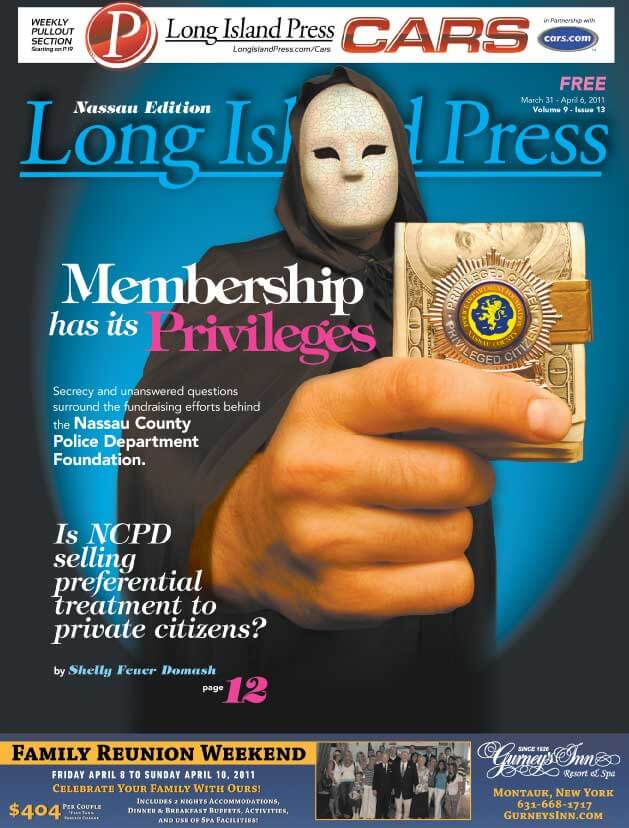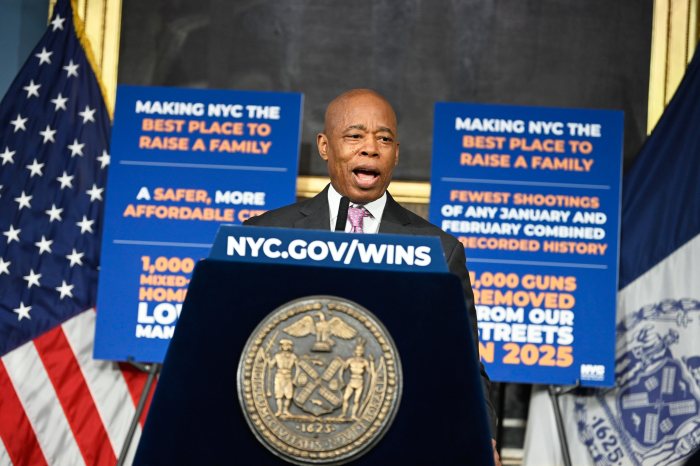Paper Trail
On March 5, 2010, then-Nassau County Police Chief of Department Karen O’Callaghan issued a department notification sent to all commands. The memo, obtained by the Press, describes the newly formed foundation as a “public/private partnership that will provide the financial support to build and maintain a new, state of the art Police Academy for the Nassau County Police Department.”
Among other controversial declarations, as current and former members of the Nassau County Police Department describe the content—as well as outside law enforcement experts interviewed by the Press—it states: “To assist with the fundraising efforts, the NCPD Foundation has established a board composed of benevolent business executives. All board members have been issued photo identification.” Press requests for a copy of these identifications or at least a detailed description of them from the NCPD were unfulfilled as of press time.
“Other Nassau County Police Department board members possessing Department issued identification cards are the Nassau County Law Enforcement Exploring Board and Nassau County Crime Stoppers,” it adds.
“In the course of your police work should you come in contact with any of these individuals and needed to verify the person as a member of those boards, you can do so by contacting Central Detectives squad- Main Office Section at ext 7717 twenty four hours a day, seven days a week,” the memo continues.
It is this last paragraph that has sparked the most controversy. More than a dozen police officials interviewed for this article tells the Press it has a subtle, yet very significant meaning: The bottom line was to tell the department’s officers that if any of these members were stopped for a traffic violation, or any other police incident, they were to be given a “courtesy,” with the intent of possibly ignoring any violations.
“In other words,” explains a former high-ranking official with more than 30 years of experience within the Nassau Police Department, “they were to be given special treatment that would be different from the general public and the ID cards were meant to convince a police officer that these people were connected to the highest members of the department.”
Haberfeld, the John Jay College expert on police integrity, describes Nassau’s actions as unprecedented.
“I don’t know of any police organization in the U.S. or the world that gives special treatment to a class of citizens that contribute to the department,” she asserts. “This would be 100-percent unethical.”
“It would not just be unethical, it is against the rules and regulations of any department,” continues Haberfeld.
“It is unusual to give police IDs especially after 9/11 to anyone other than certified trained functional police officers,” adds Joseph F. King, PhD, an associate professor in the same department at John Jay and, among other titles he’s held, was former chief of the National Security Section of the Department of Homeland Security in New York and 33-year veteran of the Middle East Division of U.S. Customs in New York, where he served as its Supervisory Agent In Charge.
James Carver, president of the nearly 2,500-strong Nassau County Police Benevolent Association and 25-year veteran of the NCPD, tells the Press he was angry after reading the memo. He worries about the implications it would have on the officers he represents.
“My concern would be: What if they didn’t give them the courtesy? Would that signal the end of their career?” he asks.
Carver takes particular exception to the line: “All the board members have been issued photo identification.”
“No one should have a police ID who is not employed by the police department,” he says, bluntly.
Commissioner Mulvey tells the Press the IDs given to foundation members were issued “to facilitate the members of the group when going in and out of police headquarters”—adding that members were also given police shields. He refused to clarify why foundation members needed this kind of access to police headquarters. Press requests for a copy of these shields or at least a detailed description of them from the NCPD were unfulfilled as of press time.
According to sources interviewed for this story, these privileges are not granted to a host of other groups that support the police department, the Press has learned.
Even retired members of the police force do not get the same privileges, no matter how long they were on the job, say the dozen-plus current and retired police officials interviewed by the Press.
New York City also has a police foundation, but in contrast to Nassau County’s policy, according to New York City Police Department Spokesperson Sgt. Carlos Nieves, who says: “Members of the Police Foundation are not issued police identification.”
Commissioner Mulvey has stated in media reports his immediate post-retirement mission is to continue his work with the foundation. He refused to comment when asked by the Press for his justification and his reasoning for distributing the police foundation memo department-wide. He suggested asking O’Callaghan, now retired from the department.
Yet O’Callaghan, the highest-ranking woman in Nassau County Police Department history and recently named Hofstra University’s new director of public safety, tells the Press it was Commissioner Mulvey who approved the memo before publication, insisting it was written to serve only as a departmental notification about the credentials. She could not comment on how many times a similar memo was sent department-wide, explaining she did not serve as chief for that long. She added, however, that this is the first and only time she had written a memo such as this.
Senior members of the department, many with more than 35 years’ experience, tell the Press they had never seen a memo as blatant and they regard its contents as not only offensive, but sending a loud and clear message: The department has traded its integrity for cold, hard cash—and a select group of businesspeople have purchased undue influence.

































